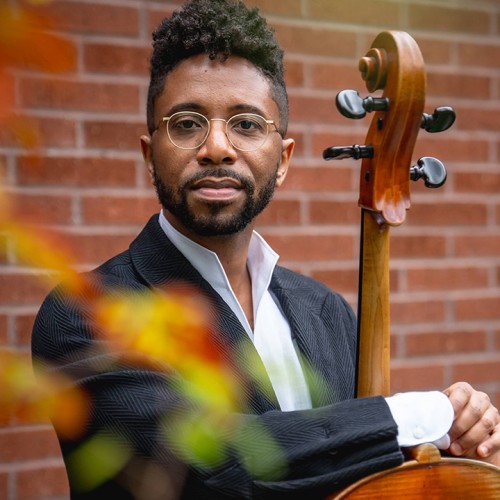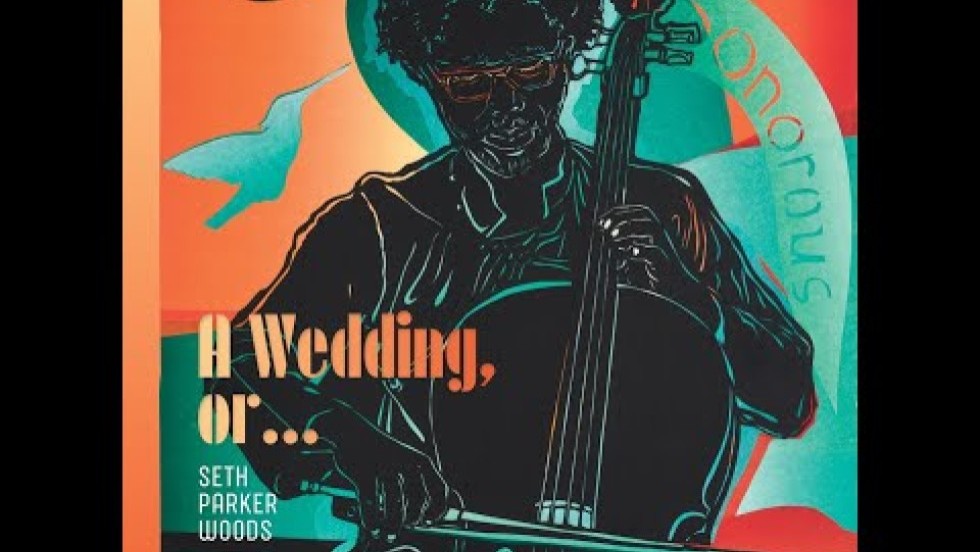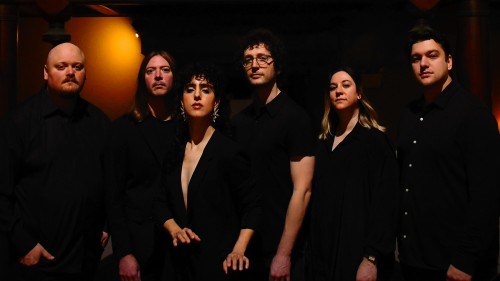
Seth Parker Woods, cello
Thus Spoke Their Verse
Cookie Notice
This site uses cookies to measure our traffic and improve your experience. By clicking "OK" you consent to our use of cookies.
Hailed by The Guardian as “a cellist of power and grace” who possesses “mature artistry and willingness to go to the brink,” two-time Grammy-nominated cellist Seth Parker Woods is a versatile artist and innovator across multiple genres.
For his Celebrity Series debut, Woods pairs three Sarabande movements from Bach’s unaccompanied cello suites with 20th- and 21st-century works. From Coleridge-Taylor Perkinson's Lamentations, “Black Folk/Song Suite” to Fredrick Gifford’s Difficult Grace for speaking cellist and electronics, Woods has assembled a program he calls an "ode to self and my love letter to the cello and the works and stories I’ve been able to share for the past 30 years."
Seth Parker Woods: Thus Spoke Their Verse
Complete program and selected notes from Mr. Woods' press materials
Program:
Johann Sebastian Bach | Suite No. 1 in G Major, BWV 1007, IV. Sarabande
Coleridge-Taylor Perkinson | Lamentations, “Black Folk/Song Suite”: III. Calvary Ostinato
Giacinto Scelsi | Maknongan
Fredrick Gifford | Difficult Grace
J.S. Bach | Suite No. 2 in D Minor, BWV 1008, IV. Sarabande
Nathalie Joachim | Dam Mwen Yo
Alvin Singleton | Argoru II
Monty Adkins | Winter Tendrils
J.S. Bach | Suite No. 5 in C minor, BWV 1011, IV. Sarabande
Conrad Beck | Drei Epigramme für solo cello
I. Moderato
II. Tranquillo
Carlos Simon | Between Worlds
Chinary Ung | Khse Buon
Program:
Johann Sebastian Bach | Suite No. 1 in G Major, BWV 1007, IV. Sarabande
Coleridge-Taylor Perkinson | Lamentations, “Black Folk/Song Suite”: III. Calvary Ostinato
Giacinto Scelsi | Maknongan
Fredrick Gifford | Difficult Grace
J.S. Bach | Suite No. 2 in D Minor, BWV 1008, IV. Sarabande
Nathalie Joachim | Dam Mwen Yo
Alvin Singleton | Argoru II
Monty Adkins | Winter Tendrils
J.S. Bach | Suite No. 5 in C minor, BWV 1011, IV. Sarabande
Conrad Beck | Drei Epigramme für solo cello
I. Moderato
II. Tranquillo
Carlos Simon | Between Worlds
Chinary Ung | Khse Buon
From Mr. Woods' tour press release, learn more about the program:
Thus Spoke Their Verse comprises a varied program of traditional and contemporary works, anchored by three Sarabandes from the first, second, and fifth Bach suites, dating from around 1720. Discussing the significance of these selections, Woods has described Sarabande movements as “deeply human and contemplative” – making them ideal departure points used throughout this concert to express the path he’s taken as a classically trained cellist exploring a multi-genre soundscape. In the artist’s words, these departures represent “opportunities to step from a familiar experience toward the possibility of something radically new.”
Another of the program’s key works, Frederick Gifford’s Difficult Grace, was inspired by Dudley Randall’s poem Primitives. In his program notes, Gifford said, “I wanted to create a musical process, a kind of sonic network of relations that would set Randall’s original poem in dialogue with itself in musical time, both verbally and sonically. In Difficult Grace, I hoped to create a work where aspects of Randall’s poem (rhythms, durations, phonetic timbre, syntax and meaning) would generate each musical gesture (even the title is a line from this poem); and Seth’s voice and cello would be the instrument – all of the sounds in the live electronics layers are untransformed recordings of his performance.”
Also featured on the concert program is Nathalie Joachim’s Dam Mwen Yo. Translating to “my ladies” in Haitian Creole, this work is a tribute to the fearless and loving women who are pillars of their homes and communities, all while carrying the weight of their families and children on their backs. The composer said, “this piece and the voices within it are representative of these ladies—my ladies. And the cello sings their song—one of strength, beauty, pain and simplicity in a familiar landscape.”
Commissioned for Woods by the Swedish Arts Council, Monty Adkins’ Winter Tendrils was inspired by a vision of freshly fallen snow on the fragile bare branches of a tree, an image that is overlaid on itself several times over in this layered composition. The solo cello introduces the main musical line, which is then enhanced as “tendrils” from this line are superimposed, transposed and fragmented. Ultimately, five canonic lines (tendrils) spin off from the initial line and are heard simultaneously, creating a rich harmonic web. The works’ second section draws on materials from the first, creating further tendrils from the harmonic, timbral and melodic implications of the opening movement.
Carlos Simon’s Between Worlds is a piece composed as a tribute to Bill Traylor, who was born a slave in Alabama in 1853 and died in 1949. This evocative work reflects on separate worlds—rural and urban, Black and White, old and new. The themes of mystical folklore, race and religion highlight the complexity of Traylor’s world, reflecting the newly freed Black man’s inspiring bid for self-definition in a dehumanizing segregated culture. Simon said, “I imagine these solo pieces as a musical study, hopefully showing Traylor’s life between disparate worlds.”
Chinary Ung’s Khse Buon, translating to “four strings” in the Cambodian composer’s native language, evokes a broad tableaux of the composer’s individual and cultural past. With the music of Bach as a touchpoint, Ung draws inspiration from giving voice to people and ideas that might otherwise be lost. As a work performed by Woods for some 20 years, it represents an integral contribution to a program of innovative and fascinating worlds for solo cello.
From Mr. Woods' tour press release, learn more about the program:
Thus Spoke Their Verse comprises a varied program of traditional and contemporary works, anchored by three Sarabandes from the first, second, and fifth Bach suites, dating from around 1720. Discussing the significance of these selections, Woods has described Sarabande movements as “deeply human and contemplative” – making them ideal departure points used throughout this concert to express the path he’s taken as a classically trained cellist exploring a multi-genre soundscape. In the artist’s words, these departures represent “opportunities to step from a familiar experience toward the possibility of something radically new.”
Another of the program’s key works, Frederick Gifford’s Difficult Grace, was inspired by Dudley Randall’s poem Primitives. In his program notes, Gifford said, “I wanted to create a musical process, a kind of sonic network of relations that would set Randall’s original poem in dialogue with itself in musical time, both verbally and sonically. In Difficult Grace, I hoped to create a work where aspects of Randall’s poem (rhythms, durations, phonetic timbre, syntax and meaning) would generate each musical gesture (even the title is a line from this poem); and Seth’s voice and cello would be the instrument – all of the sounds in the live electronics layers are untransformed recordings of his performance.”
Also featured on the concert program is Nathalie Joachim’s Dam Mwen Yo. Translating to “my ladies” in Haitian Creole, this work is a tribute to the fearless and loving women who are pillars of their homes and communities, all while carrying the weight of their families and children on their backs. The composer said, “this piece and the voices within it are representative of these ladies—my ladies. And the cello sings their song—one of strength, beauty, pain and simplicity in a familiar landscape.”
Commissioned for Woods by the Swedish Arts Council, Monty Adkins’ Winter Tendrils was inspired by a vision of freshly fallen snow on the fragile bare branches of a tree, an image that is overlaid on itself several times over in this layered composition. The solo cello introduces the main musical line, which is then enhanced as “tendrils” from this line are superimposed, transposed and fragmented. Ultimately, five canonic lines (tendrils) spin off from the initial line and are heard simultaneously, creating a rich harmonic web. The works’ second section draws on materials from the first, creating further tendrils from the harmonic, timbral and melodic implications of the opening movement.
Carlos Simon’s Between Worlds is a piece composed as a tribute to Bill Traylor, who was born a slave in Alabama in 1853 and died in 1949. This evocative work reflects on separate worlds—rural and urban, Black and White, old and new. The themes of mystical folklore, race and religion highlight the complexity of Traylor’s world, reflecting the newly freed Black man’s inspiring bid for self-definition in a dehumanizing segregated culture. Simon said, “I imagine these solo pieces as a musical study, hopefully showing Traylor’s life between disparate worlds.”
Chinary Ung’s Khse Buon, translating to “four strings” in the Cambodian composer’s native language, evokes a broad tableaux of the composer’s individual and cultural past. With the music of Bach as a touchpoint, Ung draws inspiration from giving voice to people and ideas that might otherwise be lost. As a work performed by Woods for some 20 years, it represents an integral contribution to a program of innovative and fascinating worlds for solo cello.
“In its curated cacophony, Difficult Grace elicits the same kind of awe you feel perusing your smartest friend’s bookshelf: Here are the ideas, artists, and words that shaped Woods, arranged in plain sight. Luckily for us, his library is ever growing. ”
Chicago Reader
Featured Artist
Crystal Ballroom Information
Stave Sessions is generously supported by
Susan & Michael Thonis.
This performance is generously supported by
Yukiko Ueno & Eran Egozy.
This performance is made possible in part by support from Celebrity Series' LIVE PERFORMANCE! Arts for All Innovation Funds.
Related Events

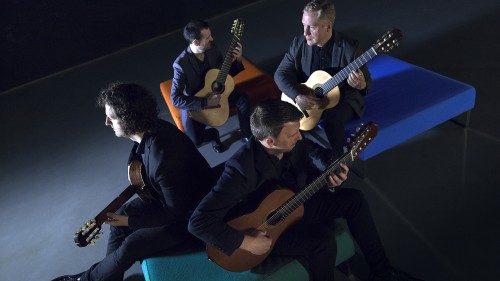
Dublin Guitar Quartet

Ringdown
Danni Lee Parpan & Caroline Shaw
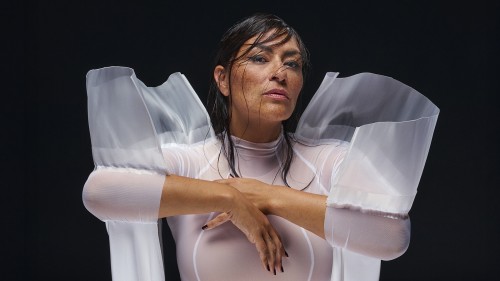
Elisapie
Stay in touch with Celebrity Series of Boston and get the latest.
Email Updates Sign up for Email Updates